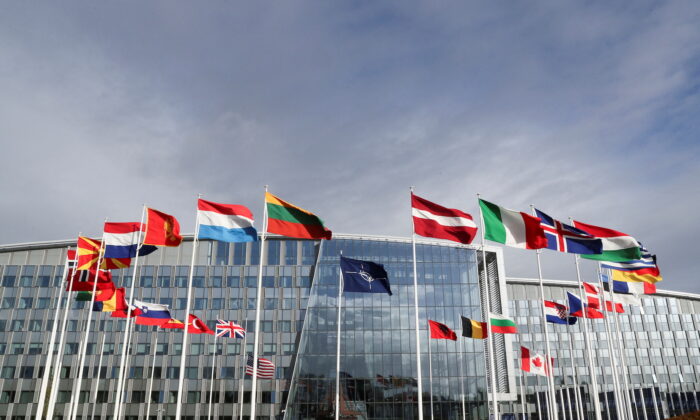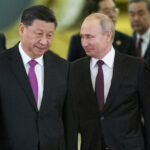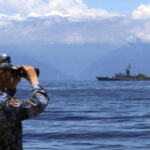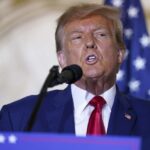By Dominick Sansone
News Analysis
China has made several official pronouncements over the last several days that suggest it is not backing away from its tacit support for Russia’s military operation in Ukraine.
Facing increased condemnation from its “pro-Russia neutrality,” as some pundits have called it, Beijing has doubled down on its support for Moscow. More than this, it has deflected from the Western pressure to denounce the Kremlin’s Ukraine incursion by accusing the United States and NATO as responsible for forcing Russia’s hand.
This has been a steady refrain from Beijing since the beginning of the conflict: verbal commitment to the principle of state sovereignty, while simultaneously empathizing with Russia for being forced into a security predicament by careless U.S. foreign policy.
China was particularly incensed at recent statements by NATO Secretary General Jens Stoltenberg about Beijing’s “obligation” to condemn Russia’s actions. The notion of a foreign power telling China that it has a responsibility to act in a specific way on the world stage was too much for the leaders of the Chinese Communist Party (CCP).
As such, the Chinese mission to the European Union responded: “As a Cold War remnant and the world’s largest military alliance, NATO continues to expand its geographical scope and range of operations. What kind of role has it played in world peace and stability? NATO needs to have good reflection.”
The mission additionally went on to state that “[China] will never forget who bombed our embassy in the Federal Republic of Yugoslavia.” This is in reference to the 1999 NATO campaign against Belgrade-controlled Serbian forces during the Kosovo separatist crisis. Several bombs had landed on China’s embassy, although the United States maintains that this was an unfortunate accident.
Beijing indignantly responded to Stoltenberg’s perceived disrespect with the statement that China “needs no lecture on justice from the abuser of international law.”
For all of its standard retorts about the need to abide by the decisions of multilateral institutions and to respect global supranational bodies such as the United Nations, the CCP’s response is telling.
Apparently, China’s commitment to the new “interconnected” world—a common theme of CCP leader Xi Jinping’s Davos Summit speech this year—does not extend to issues that Beijing can gain no geopolitical advantage from.
In other words, China is never going to act in a manner that it deems contrary to its national interests. Forget talk about absolute abstract principles such as sovereignty or the right to exist as a nation. These are only tools that Beijing utilizes in accordance with the one true organizing principle of its foreign policy: securing the CCP’s power at home, and ensuring its ability to project power into its geographical proximity in particular and the world in general.
China is a major power with a sphere of influence that it believes should be directly subject to its national security concerns; namely, the right to halt Western expansion and influence into that geographic cordon sanitaire. Russia operates according to this exact mode of thinking as well. Its operations in Ukraine are currently being conducted, despite any other pretenses that Moscow is using as justification, to halt U.S. military power creeping closer to the Russian heartland.
NATO may already be on Russia’s border in the Baltics, but Ukraine is considered to be an integral part of Russian culture and its historic statehood. Kyiv’s continued aspirations to join NATO is representative of a red line that Putin has been emphasizing since he took office. The notion of U.S. nuclear-capable missile systems being within 10-minutes striking distance of Moscow—from the cradle of Russian civilization—is too much for the Kremlin to handle.
The reference to Kosovo has important implications for understanding the geopolitical lens through which China and Russia approach international relations, as well. Both countries compose vast landmasses, and have a plurality of different ethnicities and cultures located within their borders. NATO’s intervention into Serbia was seen as an aggressive move to ensure the self-determination of the ethnically Albanian Kosovo, a region that is also an important historical site for Serbian history.
The significance of the events of 1999 is that they still fuel Beijing and Moscow’s concern over NATO. Say there is a renewed effort to secede from the Russian Federation in one of the country’s predominantly Muslim Caucasus republics, or a genuine separatist movement in China. Would the transatlantic alliance intervene if they disapprove of the means that the two respective countries use to subdue those movements?
Moscow and Beijing are suspicious of the West’s intentions, and are especially skeptical about NATO’s assurances that it is simply a defensive alliance. Why does the right to self-determination for Kosovo precipitate a sustained bombing campaign on a sovereign nation, while the wish for independence in the ethnically Russian Donbass republics receives only unequivocal condemnation?
Whether it was just because he was expected to say it due to his prominent position, or whether he is naïve enough to actually believe, Stoltenberg’s claim that China has an “obligation” comes from a fundamentally flawed premise. Despite the abundance of flowery language about cooperation and interconnectedness, Beijing does not act to ensure a flourishing world community.
Instead, it acts for the interests of the CCP, and the CCP alone.






